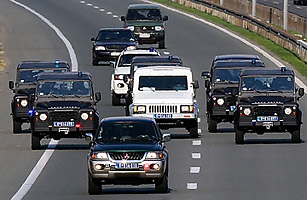
For over a decade, Bosnian Serb general Ratko Mladic was one of the world’s most wanted men. Tuesday evening, May 31, as the metal doors of the Dutch prison in Scheveningen closed behind him, their clang heralded an overdue victory for international justice and possibly a new beginning for Serbia, where the general spent most of his fugitive years. Mladic, who was indicted almost 16 years ago for the 1995 genocide in Srebrenica and other war crimes, will be tried before the International Criminal Tribunal in the Hague along with top Bosnian Serb civilian leader Radovan Karadzic, who was arrested three years ago in Belgrade.
But many in Serbia still see Mladic as a hero and a champion of Serb nationalism. The country is deeply divided over its role in the 1992-95 war that began when the multiethnic state of Bosnia and Herzegovina attempted to carve out its independence from the remains of Yugoslavia. Serbia, which retained the name Yugoslavia until 2003, was often accused of harboring Mladic and other indicted war criminals. Last Sunday, more than 100 people were arrested and about a dozen injured during violent protests against Mladic’s arrest.